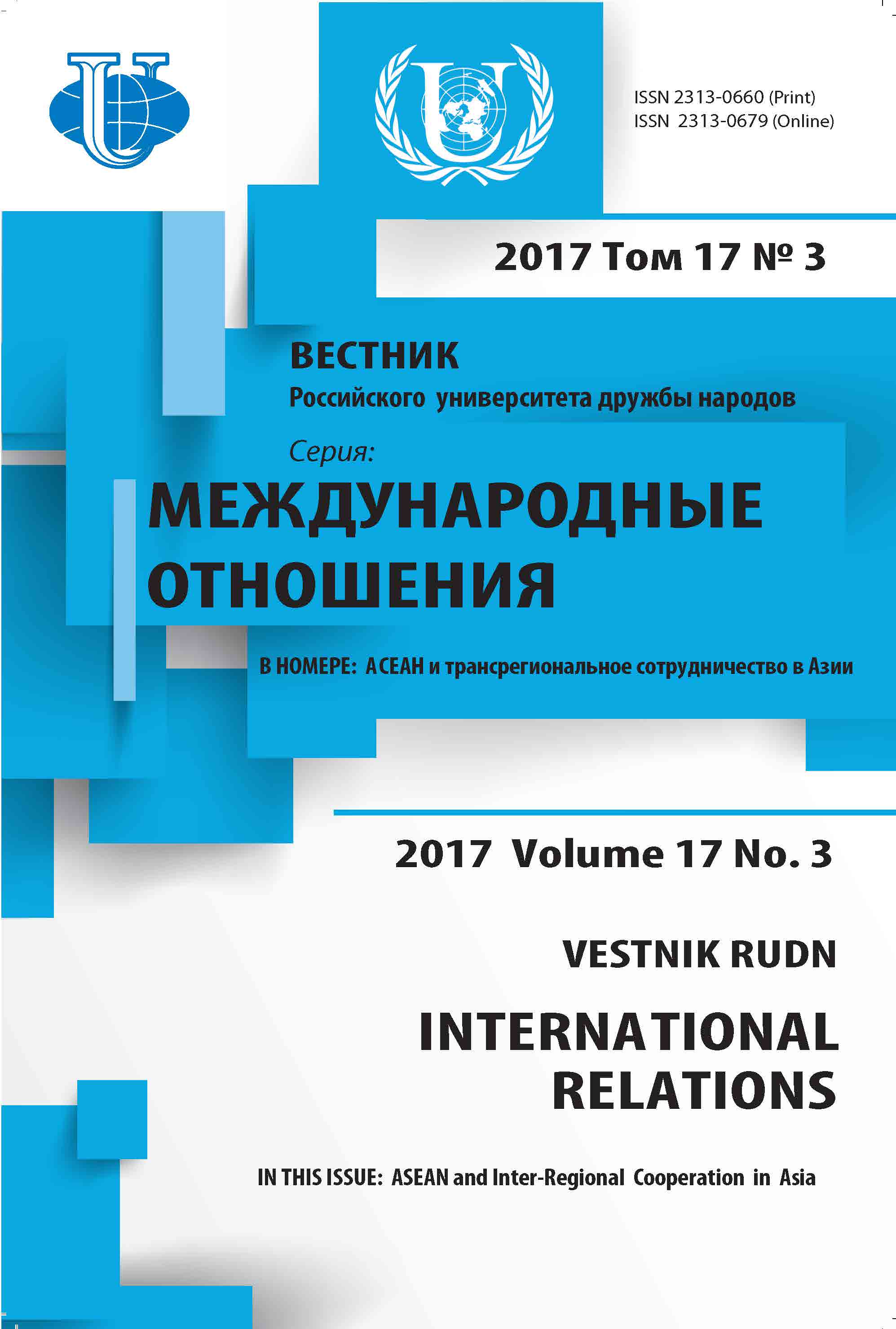THE INFLUENCE OF THE ‘CHINESE FACTOR’ ON THE DEVELOPMENT OF RUSSIANCAMBODIAN RELATIONS
- Authors: Bektimirova NN1
-
Affiliations:
- Moscow State University, Moscow, Russia
- Issue: Vol 17, No 3 (2017): ASEAN and Inter-Regional Cooperation in Asia
- Pages: 483-495
- Section: THEMATIC DOSSIER
- URL: https://journals.rudn.ru/international-relations/article/view/16761
- DOI: https://doi.org/10.22363/2313-0660-2017-17-3-483-495
- ID: 16761
Cite item
Full Text
Abstract
This article considers the specificity of Russian-Cambodian diplomatic relations which cele-brated 60 years in 2016. The author shows that in the 20th century ideological considerations, namely the po-litical rivalry between China and the USSR, largely dominated in bilateral relations. The ‘Chinese factor’ - China being ‘friend number one’ for Cambodia - drastically influenced USSR’s position on most issues relating to this country. The research demonstrates that both Russia and Cambodia are nowadays inclined to implement a purely pragmatic, non-ideological foreign policy, modifying it and their interests depending on the current situation. Thus, the ‘Chinese factor’ - China’s economic domination in Cambodia - can hardly become a major obstacle to the development of Russian-Cambodian relations, at least in the me-dium-term. Russian aspiration to solidify its position as an influential center of an evolving polycentric world demands the building of constructive relations with all ASEAN member states. This approach includes Cambodia - a relatively small country in terms of human, territorial and economic resources. It would also promote a more stable system of international relations in South-East Asia as a whole, while at the same time partially offsetting Chinese political and economic dominance in Cambodia.
About the authors
N N Bektimirova
Moscow State University, Moscow, Russia
Author for correspondence.
Email: nabektimirova@yandex.ru
Doctor of History, Professor, Head of Department, History of South-East Asia, Moscow State University, Institute of Asian and African Studies
References
- Becker, E. (1998). When the War Was Over. New York: PublicAffairs.
- Bektimirova, N.N. (2015). Traditional factors in Cambodia's foreign policy at the present stage. South East Asia: Actual Problems of Development, XXVI (26), 114—137. (in Russ.).
- Bektimirova, N.N. & Selivanov, I.N. (2002). The Kingdom of Cambodia: Political History (1953—2002). Moscow: Gumanitarii. (in Russ.).
- Chanda, Nayan. (2002). China and Cambodia: in the Mirror of History. Asia Pacific Review, 9 (2), 1—11. DOI: http://dx.doi.org/10.1080/1343900022000036043.
- Chandara, Khun. (2013). Cambodia-China Relations Based on the Mutually Beneficial Interests: China, «the Most Trusted Friend» beyond Doubt. Research Paper. URL: https://www.researchgate.net/ publication/261988062_Cambodia-China_Relations_Based_on_the_Mutually_Beneficial_Interests_ China_the_%27Most_Trusted_Friend%27_beyond_Doubt (accessed: 12.03.2017).
- Ciorciari, J.D. (2013). China and Cambodia: Patron and Client? IPC Working Paper Series Number 121. International Policy Center, Ford School, University of Michigan. URL: https://papers.ssrn.com/ sol3/papers.cfm?abstract_id=2280003 (accessed: 12.03.2017).
- Jeldres, J.A. (2012). Cambodia's relations with China. A Steadfast Friendship. In: Cambodia. Progress and Challenges since 1991. Ed. by Pou Sothirak, Wade G., Hong M. Singapore: Institute of Southeast Asian Studies, p. 81—95.
- Jeldres, J.A. (1995). The Cambodian Constitutions (1953—1993). Bangkok.
- Maletin, N.P. (2004). Foreign policy of Cambodia. Tutorial. Moscow: MGIMO-Universitet. (in Russ.).
- Mosyakov, D.V. (2010). History of Cambodia. The twentieth century. Moscow: IOS of RAS. (in Russ.).
- Reilly, J. (2012). A Norm-Taker or a Norm-Maker? Chinese aid in Southeast Asia. Journal of Con¬temporary China, 21, 71—91. DOI: http://dx.doi.org/10.1080/10670564.2012.627667.
- Richardson, S. (2010). China, Cambodia, and Five Principles of Peaceful Coexistence. New York: Columbia University Press.
- Smith, R.M. (1965). Cambodia's Foreign Policy. New York: Cornell University Press.
- Sutter, R., Chin-hao, Hyang. (2012). China-Southeast Asia Relations: Hu visits Cambodia as South China Sea Simmers. Comparative Connections. A Triannual E-Journal on East Asian Bilateral Relation. URL: https://search.proquest.com/openview/ea61044f040e3389873c8c4200321d9d/ 1?pq-origsite=gscholar&cbl=816337 (accessed: 12.03.2017).
- Tarling, N. (2012). Britain and Sihanouk's Cambodia. Singapore: NUS Press.
Supplementary files










